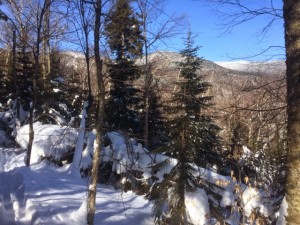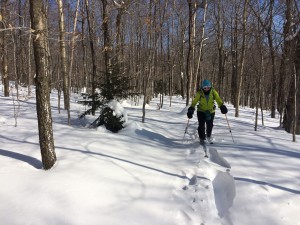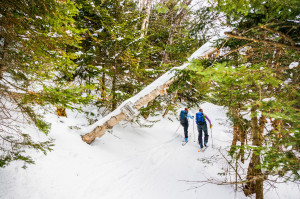The Catamount Trail is unique to Vermont and the Vermont winter of 2014-2015 has offered skiers on the Catamount Trail the equally unique opportunity to thru-ski the entire 300 miles. The quality as well as abundance of snow during this very cold winter has provided coverage and unlimited possibilities.
The following story appeared in the Rutland Herald & Times Argus, ACTIVE VERMONT section, Sunday, March 8, 2015.
Snow and Cold
This has been a winter to remember. For some, memories of battling the cold, shoveling snow off roofs and moaning about the salt brine that sticks to vehicles as well as roads, are not the best reminders of the winter of 2014-2015. But for others, this has been an astonishing trip and it is still going.
Recreational snow sports participants, competitive athletes and kids of all ages love the white stuff, and this has been white stuff to love.
Alpine ski areas boast multiple feet of snow, 100% open trails and powder, yes powder, in the north east. Cross-country ski areas have not been hampered by the lack of snow-making and VAST snowmobile trails have never looked better. Out the back door, on with the snowshoes, and there’s adventure to be had for almost anyone.
What makes this year’s snowfall so special? Amy Kelsey, Executive Director of the Catamount Trail Association, explains. “The abundance and the cold,” she said. “There are no layers of ice. The snow is soft, not crusty. Significant amounts of snow make breaking trail challenging, but the abundance and quality of the snow provide uniform coverage.”
Catamount Trail
The Catamount Trail extends 300 miles from Massachusetts to Canada through the state of Vermont. Since 1984 the Trail has been developed, managed and conserved by the member-driven Catamount Trail Association. At times, some of the 31 sections of trail are unavailable due to poor snow coverage. Not this year. “With several feet of snow in some locations, 2015 has been a banner year for winter enthusiasts,” wrote Andy Wood, Outreach & Youth Program Coordinator CTA in a recent press release, “and thru-skiers on the Catamount Trail reported deep snow and excellent trail coverage across the state.”
The Catamount Trail beckons skiers of all levels. Some choose to spend a few hours on cross-country skis or even snowshoes enjoying a local section of the trail. Time or skill constraints make this a possibility. Others embark on more challenging uses of the trail and most often with back country (BC) skis and gear.
Then there are those who choose to ski the entire distance. “Thru-skiers undertake the 300-mile trip in one journey,” Woods said, “camping along the trail or staying in the homes of CTA members and friends.”
“Of the 70-plus skiers who have skied the entire trail, few undertake the journey in one season, let alone in one expedition. Currently at least four separate attempts to thru-ski the Catamount Trail are underway or recently completed.”
Inn to Inn
On Tuesday night, Bob Ordemann was in Lowell, just 28 miles from the finish of his thru-ski. Ordemann, from Groton MA, began on the southern end of the trail and pursued a unique journey, carefully arranging in advance with innkeepers along the way who often helped pick up or drop off at the trail after spending the night at their inn.
Ordemann has skied alone as many do. “Skiing alone forces me to engage with other folks,” Ordemann said. “I meet people I would never meet with somebody else. The variety is stunning.”
The hours of solitude on the trail balanced the social interaction at the inns. “I wanted to clear my head and relax,” Ordemann said. Fortuitously between jobs, he has been able to do this with the support of his wife and three kids, all of whom now have bragging rights to his soon-to-be success.
With storms pounding the states south of Vermont, one can only imagine the amount of snow Ordemann faced in Massachusetts. “I struggled early on, there was so much snow. Sometimes I broke trail in 20” and in Sections 3 and 4 the drifts were dense.”
There has been, however, a good side to the intensity of effort. Did the cold bother him? “Not at all. It was surprising but I was working so hard breaking trail that I kept warm.” Dressing appropriately, of course, is a must. So is fitness.
“I’m rather fit,” Ordemann said, “and because I compete in triathlons and running races, I train all year round.” As to ski skills, however, Ordemann said: “This is a do-able trail. If you have determination, basic skills, can side-step, snow plow and herring bone, you can do it.”
Ordemann spent leisure hours posting photos, travel notes and helpful advice on planetbcatamount.blogspot.com.Check it out.

“Wednesday, February 18, 2015, Blueberry Hill to Rikert XC ski center “The ski from BB Hill to Rikert (thru to Wagon Wheel road) was the most pleasant 12 miles of skiing I’ve done on the trail. The terrain was undulating, but relatively flat, and in the woods. The trails were all groomed or broken. There was a nice long downhill with bumps heading down to highway 125.
Photo by Bob Ordemann.
17 Days
Sam Blakely, owner of Hermit Woods Trail Builders in Norwich, thru-skied the trail in 17 days, camping out every night but one (a visit to his grandma in Middlebury). Blakely has a history of experience in the backcountry beginning with trail building behind his dad as early as 8 years old, and moving on to long-distance hikes and paddles. “Every year I guide month-long canoe trips to northern Quebec,” Blakely said. “That was why I set out on this adventure. I love being in the woods, the rhythm that a trip falls into, and the peace and serenity I find by slowly moving across a landscape.” Looking for a different adventure, “the Catamount seemed a right fit.”
While Blakely brought strong outdoor skills to his challenge, his ski skills were something less. Formerly a downhill skier, Blakely gave cross-country skiing a try because of his girlfriend. “Since she was so passionate about it, we would go out together, she gracefully gliding along while I shuffled and huffed and puffed behind, arms akimbo as I tried to keep up. I didn’t even like it all that much at first.”
Things must have changed. Finishing the trail in 17 days indicates some powerful skiing.
Temperatures were extreme, well below zero. “Every minute of every day I was conscious of my body and my extremities,” Blakely said, “and maintaining sufficient warmth and circulation was always at the forefront of my mind.”
Nights were long with almost 13 hours of darkness. He carried a small tent (“on several mornings I woke up with just the top 10-12” showing above the newly fallen snow”), 3-4 days of food, (Consuming enough calories was necessary yet he still lost 8 pounds on the trail.) and a Whisperlite stove. “Each night I just packed out an area of snow, set the tent up, cooked my dinner, and then crawled into my sleeping bag for some reading and writing.
Perhaps most memorable for Blakely, however, were the people. Other skiers, store-owners, folks in a general store – all were supportive, generous and shared his enthusiasm.
“It was so cold out there that mistakes would not have been good,” Blakely said. “And that, in and of itself, was liberating and exciting.”
“By living like that, alone in the snow and cold, I knew that I was capable and self-sufficient. I could face challenges and conquer them, and keep on making progress, while also enjoying the stunning beauty and wintry silence of a Vermont forest landscape.”
SUE JOHNSTON’S STORY
Sue Johnston of Danville has a different take on snow conditions. Despite her early worries that there might not be enough snow, its abundance hasn’t always been in her best interest. Johnston skis alone. “If the trail’s not broken out,” she said, “it’s really hard to trail break by yourself.”

Sue Johnston, Little Pond in Section 5 of the Catamount Trail, near Stratton. Photo by Chris Scott. (2/2015)
Johnston, primarily a Nordic skier who has chosen to ski the length of the Catamount Trail this season, brings a mixed bag of skills to her plan. “I am not a gifted skier,” she said. “mostly touring center. BC (back country) is new to me. I am so not a BC skier.” Last year she bought BC skis, “a little wider with metal edges, and soft boots that come up a little higher. I’m a snow-plower. I don’t do tele (telemark)turns.”
What Johnston must confess, however, is that she has a history of endurance sports: ultra running, distance hiking, (Appalachian Trail and Long Trail), and winter hiking in neighboring New Hampshire mountains.
This is significant. Yes, Johnston skis alone, but she’s fit, experienced and “knows what to put in a pack.” She is an excellent example of what CTA teaches and encourages: you don’t need superior ski skills but you do need to prepare thoroughly and understand risks as well as self-sufficiency.
“I like to make grand goals,” Johnston said, “and reach them.” On January 18 her journey began at the Canadian border. With the help of her husband, a non-skier, who supports by dropping off or picking up, snowshoeing in to bring supplies or to check on her, Johnston skied as far as Camel’s Hump in Duxbury. She did so in day trips, going home each night and missing a day now and then.
Because it seemed easier to follow the guide from the south, she decided to change tactics and, on February 18, hit the trail in Massachusetts and has, so far, gotten to Heldville, near Ludlow. What remains are the sections connecting Camel’s Hump with Heldville, and she hopes to finish these before the end of the month.
For Johnston, who must deal with the cold hands of raynauds syndrome, managing the sub-zero temperatures has been challenging. “The cold has been such a pain,” she said. Chemical handwarmers helped, but grasping the poles was problematic.
After so many days of cold, however, she said she became acclimated to it. “There were a couple of days with severe wind chill warnings. I had intended to start at 7 a.m. but told myself ‘I can’t do this,’” so spent a few hours over coffee before a delayed start.
Johnston’s advice is uncomplicated: “Watch the weather and know your limits.”
Johnston makes it clear that skiing alone is not for everyone. She was surprised by the extent of cell phone coverage, but knew better than to rely on it. “Concerns cross my mind,” she said, “but I’m never afraid. I’m always comfortable outside in the woods by myself and carry enough to survive an emergency.” Except for lightening, cold rain, and city subways, not much alarms her. But, then, her off-trail partner knows where she is.
End-To-Enders
Not all who embark on the journey plan to complete it in one trip. “Since the inception of the Catamount Trail, nearly 70 intrepid skiers have completed all 32 sections,” Wood said. Some complete section by section with days, weeks or even years off in between. All deserve kudos as successful End-To-Enders.
In the stories of Ordemann, Blakely and Johnston, one thing becomes clear: while advanced ski techniques may be helpful, they are not mandatory. What IS mandatory is a functioning level of strength and endurance, a huge dose of determination and an appreciation for the Vermont outdoors, an appreciation that is best coupled with experience, planning and respect for what nature might deliver.
This is where the Catamount Trail Association can help. Visit the website http://catamounttrail.org. There you will find answers to questions you might not even know to ask. CTA maintains trails, works with landowners, provides education and sponsors guided tours and events.
Timid or unsure? Ski with others. Considering an overnight? Check out the Winter Camping Guide. Want to know what it’s like before you head out? Look to those who have gone before. You might be breaking trail in the snow, but you do not need to reinvent the wheel. Others are happy to share their stories and helpful information with you.
“Contact us,” Kelsey said. “It’s fun for us to help you make connections. Don’t let the winter and cold keep you from being outside. The Catamount Trail is only one of many. I’ve bundled up and gone out and it’s made me happy.”
The remarkable snowfall, cold temperatures that can be dangerous but have created a quality of snow unparalleled for recreational use, spectacularly crisp, clean and clear vistas, and the availability of a designated trail system, can be acknowledged from the comfort of an armchair in front of a blazing fire, but are best understood through involvement.
“The Catamount Trail,” Kelsey said, “gets you to places you can only imagine.”
The Catamount Trail Classic
Section 22, the stretch of trail from Bolton to Traps may be the most frequently skied and dramatic section of the Catamount Trail. On Sunday, March 15, CTA offers a fund-raising event to benefit the CTA’s Ski Cubs and Youth Ski Program. “This is not a race,” Kelsey said. Come enjoy a 9 mile climb of about 1,000’ followed by a 2000’ descent into the Nebraska Valley, all supported and with a sweep provided to be sure that all participants have a safe and enjoyable day. Follow it up with an after-party at Trapp’s with a “few surprises.” This event offers a perfect opportunity to sample the Catamount Trail if you haven’t already. If you have, come show your support and celebrate a ski season to remember.
ACTIVE VERMONT, Linda Freeman, Contributing Writer and Field Editor.

